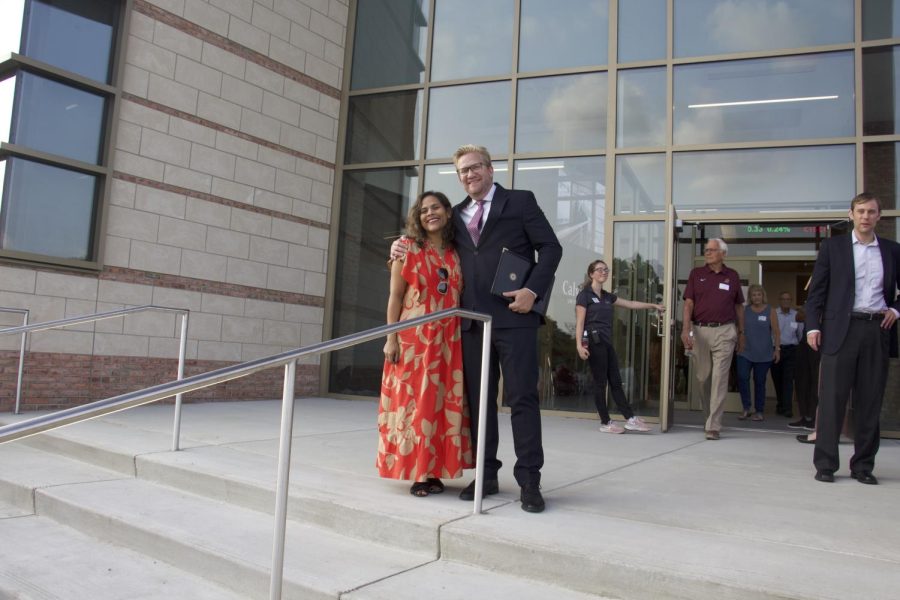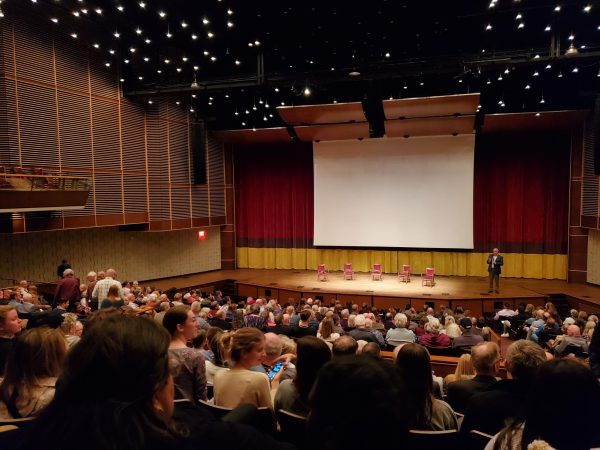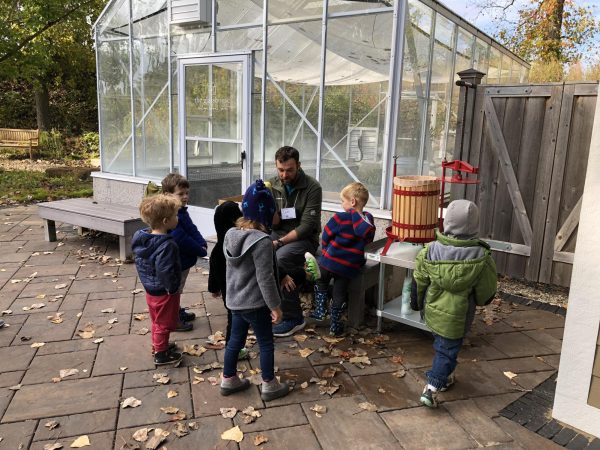More than Wiebe’s wife: Joanna Boer brings passion, experience to Calvin as presidential spouse
Joanna and Wiebe have filed a complaint against Calvin in federal court.
In the garden, the breeze is tinged with the scent of hibiscus. Birds perch on nearby trees, which burst with cashews, grapefruit, oranges and mangoes. In the distance, mountains emerge from the earth, set against blue skies. There is an overwhelming sense of peace.
Some might call this a paradise. For Joanna Bachew Boer, the wife of University President Wiebe Boer, it is her childhood home on the island of Trinidad, where her father worked at a Christian camp called Victory Heights Bible Camp.
“It really was a beautiful, magical childhood,” she said. “Up in the mountains, you feel set apart.”
Boer told Chimes that she was “very much a tomboy.” “My mom was frustrated because she would have maybe liked me in pretty dresses,” said Boer, “[but] I didn’t want to brush my hair. I would just wake up and go outside.”
One of her favorite pastimes, she said, was climbing the omnipresent cashew trees. “They have these great branches that make climbing so easy,” Boer said. “So I had my favorite cashew tree, and even in skirts or dresses, it was so easy for me to climb it. I felt like I knew those trees like the back of my hand.”
At the time, students took competitive exams around the age of 12 and were assigned to a high school based on their scores. Boer performed well. “I was very smart — don’t tell anyone,” she said, laughing. She was ultimately admitted to her top choice, the prestigious St. Augustine Girls’ High School. “It was great. We didn’t have to worry about dressing for boys!”
Exploration
Although Boer enjoyed living in Trinidad and Tobago, she wanted more. “I loved my island upbringing, but it was very small. It was very cozy, it was very intimate,” Boer said. “I always knew there was something beyond. I always had that wanderlust.”
Accordingly, in what she termed her version of a rebellious streak, Boer decided to go overseas for college. Her father had connections in the United States, who recommended what was known as Calvin College at the time. “He liked that it was a Christian school but also very academic,” she said.
The hefty cost of tuition endowed her education with expectation. “I really felt a responsibility: I have to succeed. I have to do my best,” Boer said.
After graduating in 2003 with a degree in political science and government, Boer married Wiebe Boer, who would become Calvin’s current president. The couple then moved to Mauritania, where Wiebe Boer worked for World Vision. There they had their first child. “I was very much wanting to support and raise this baby and do that in a very present way, but I also knew that I had more to give,” Boer said.
So, she pursued a master’s in human resource management from the University of London, which allowed students to learn from anywhere in the world. “I remember they sent me this huge box of content. It was all these binders, all these textbooks,” said Boer. The program took many people four years to complete, she said; Boer did it in two.
When it came time to take her final exams, the timing was not ideal. “I had my exam three weeks after my second child was born,” Boer said. “I remember being so stressed. I remember saying to Wiebe, ‘I can’t do these exams. I’m so tired.’ I was nursing, healing.”
But, Boer said, Wiebe Boer encouraged her to press onward. “He was like, ‘No. You can do this.’” She recalled sitting propped up in bed with their newborn, their first child –– now a toddler –– running around, while her husband ran through the exam materials alongside her. “It felt very much like a partnership,” she said.
Entrepreneurship
After living in Mauritania, the Boer family spent a few years in Kenya and then moved to Nigeria. There, around 2011, Boer had a promising idea.
“I love getting local gifts. I believe in shopping local,” she said. But in Nigeria, she couldn’t find high-quality, locally produced options. “Where’s the Nigerian-made quality? I couldn’t find it.”
Boer decided to fill the gap herself, starting “very organically” with a sewing machine and a tailor. “I said to myself, ‘If I fail, I [will still] have hundreds of gifts for many years.’ But I didn’t fail. People responded so well.” The homeware company, which she named Empire Jane, grew from there. It even received a grant from the Nigerian government.
“I didn’t think I was a creative: I cannot cut a straight line. I cannot sew. [But] I could see it in my head,” Boer said. “I had amazing tailors. They became my family because they brought my visions to life.”
In fact, during the COVID-19 shutdown, Boer continued paying her employees. “It gives me such pride that I was able to pay my staff. By the time we got running again, I was pretty depleted, but I was like, ‘It doesn’t matter.’ I couldn’t imagine them not having any income.”
Boer had plans to further expand Empire Jane, moving into the fashion sphere. But these plans never came to fruition. “It was about to move into this different direction –– and then God said no.”
Pivoting
When her husband first mentioned his interest in the presidency at Calvin University, Boer was shocked. “Grand Rapids felt like history. We had both graduated and moved on,” she said. She had planned to stay in Nigeria for a few years, continuing with Empire Jane, then perhaps move to Europe. “The vision I had for myself –– this was never part of it.”
As the application process continued, Boer watched her husband “open up to the possibility,” a shift that she described as “very inspirational.” “He said, ‘This is something I think I need to do,’” Boer said.
Eventually, Boer warmed to the idea, too. “It was really something supernatural that God totally softened my heart to this opportunity –– not that my heart was hard against it, but I did not ever think this was in our future,” she said. “[But] God made it clear that this was something we should do. It was almost like everything before had been preparation for it, like a soldier being called up.”
When her husband committed to the position, Boer sold her shop and some of Empire Jane’s inventory. “It was very sad, leaving that,” she said.
Complexity
For Boer, the position of spouse of the president –– a title she prefers to that of first lady, which feels “very formal” to her –– can be tricky. “I don’t define myself as Wiebe’s wife. I never have,” she said. “And in this role, that’s how I’m defined by nature.”
Boer is also Calvin’s first presidential spouse of color, which comes with its own difficulties. “People don’t want to say that. I think people are scared to tell me what I know already,” Boer said. Initially, she said, she questioned whether she had “the right look” for the position. “This is a very Dutch school. I’m not Dutch.”
Boer told Chimes that as a student at Calvin, she experienced racism in Grand Rapids because of the way she looked. One time, she was simply visiting the mall. “I had this really nice backpack … [and] I went into the store to buy some clothes, and this beautiful woman saw me come in. She said, ‘You’re going to have to keep your bag here at the desk,’” Boer said. “And I was so naive. I was like, ‘Oh, sure, no problem!’ I thought it was a service of the store, that it was just like a coat check. There was something in my mind that felt strange, but I didn’t have this framework of racism as I know it now.”
Only several years later did Boer have a moment of realization, which she described as something out of a movie. “She [the employee] thought I might steal something! I just remember, I was like, ‘Oh my gosh.’ It just felt so painful and so heavy,” she said. “That’s racism –– the judgment, the mischaracterization [based] just on how someone looks.”
Now, in her new role at Calvin, Boer said she feels “spared” because of her association with the president’s office. “Let’s be real –– prejudice exists. People stereotype,” she said. “There have been a few microaggressions here and there. I’m not as naive as I once was.”
Once, she said, someone commented on how she was dressed. “I was like, ‘That’s so weird.’ I’m fully grown –– I can wear exactly what I want,” Boer said. “You wouldn’t necessarily say anything about [the clothing of] my husband, whether it’s because of his position or sex or race. That felt off to me.”
Embracing the role
Despite these challenges, Boer is wholeheartedly committed to Calvin. “Because I feel called, I have stepped into the role fully,” she said. “It’s a platform that I’ve been given; it’s my responsibility to now make the best of it.”
When Boer first toured Calvin as the spouse of the president, she was impressed by all the good that she saw. “There were so many positive things: scholarship, research, student engagement, student success,” she said. “There are always challenges; it’s not utopia. But I was just like, ‘Wow!’ I would like to see more of these stories being told.”
She views her role fundamentally as coming alongside her husband and elevating the university. “I see myself as a champion for young people,” Boer said. “How can we give [the students] this platform to succeed and embrace life and discover and thrive –– all of it? I want to empower them. I want to give them confidence.”
With this goal in mind, Boer will serve as the keynote speaker for a Calvin women’s event on March 18. “We’ve themed the event ‘celebrate and connect’ –– the idea that we need to be celebrating each other constantly, that we’re stronger when we’re together,” she said.
Ultimately, Boer hopes to look back at her time as Calvin’s presidential spouse with satisfaction. “I like contributing and adding value,” she said. “When I leave, I want to look back with such pride and such joy that I did my best.”








